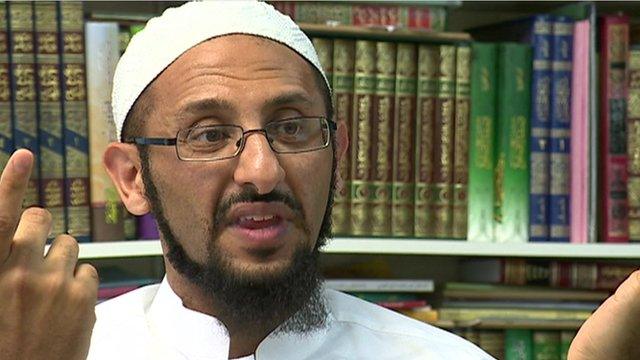'Not possible' to monitor all UK Syria fighters
- Published
Former MI6 director of global counter-terrorism Richard Barrett: "You don't know which ones are coming back... quite severely radicalised"
The security services will not be able to monitor all of the Britons who return to the country after fighting in Syria, a former MI6 director has said.
With reports that up to 500 Britons may be fighting in Syria, Richard Barrett said the number who would return to pose a terror threat was unpredictable.
Chancellor George Osborne said there would be funding to protect the UK.
This comes after an apparent recruitment video for jihadists in Iraq and Syria featured several Britons.
Former MI6 director of global counter-terrorism Mr Barrett told the BBC News Channel it was "out of the question" for the security services to follow all of the Britons who had fought in Syria if and when they returned.
"Clearly they'll have to prioritise and they'll have to choose those that they think are likely to pose the greatest risk," he said.
This footage purports to show Reyaad Khan (l) Nasser Muthana (c) from Wales
"Beyond that I think they'll have to rely very much on members of the community and other people expressing their concern and worry about the behaviour of perhaps their returned friend or family member."
Mr Barrett said the radicalisation of young Britons was "perplexing" but one reason they were heading to Syria could be the lack of a sense of identity in the UK.
He added the recruitment networks operating in Europe were "suggestive of a greater deal of radicalisation than people just going on their own" but there was not "necessarily a linear progression from being a fighter in Syria to being a domestic terrorist".
The former MI6 director said the level of threat posed by returning fighters would depend on what had happened to them while they were in Syria and why they had returned home.
"The trouble is, you don't know which ones are coming back just wanting to get on with their lives and which ones are coming back quite severely radicalised," he added.
Police have urged Britons considering travelling to Syria to fight not to do so.
They warned would-be jihadists that they were likely to be killed or kidnapped if they took part in the conflict, or likely to be arrested if they returned to the UK.
Usman Nawaz, a former member of the Young Muslim Advisory Group, described as "incredibly disturbing" a video posted by internet accounts linked to militants from the Islamic State of Iraq and the Levant (Isis) - which has a presence in Syria and is fighting government forces in Iraq.
He told the BBC it was "extremely worrying" that young British Muslims were appealing to their peers with a "rosy, romantic HD picture of jihad".
"This is young people themselves calling other peers to come and become part of this struggle, as they see it, this holy war, which it completely is not," he said.
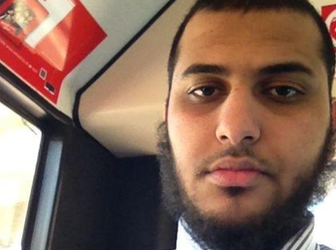
Nasser Muthana's family said it was "heartbroken"
Two of the men who appeared in the video have been identified as Reyaad Khan and Nasser Muthana from Cardiff.
This prompted claims from academic Dr Suraj Lakhani that there was an ongoing problem with the radicalisation of young Muslims in the Welsh city.
Former Cardiff councillor Mohammed Sarul Islam acknowledged there was a problem, but rejected suggestions that radicalisation was happening in mosques in the city.
"We are very much suspecting all of this preaching is happening through the internet clerics," he told BBC Radio 4's Today programme.
'Long-term' threat
Meanwhile, Mr Osborne rejected suggestions that monitoring of returning fighters would be hampered by a shortage of funds.
The chancellor said: "I don't think it's a question of the money, because we've not only protected the counter-terrorism budget, we've increased funding for the security services.
"But it's a question of priorities, I think. These are highly-trained professionals in the security services and the police and they do profiles, they work out who are most likely to be the biggest risks and of course they focus their human resources on that."
On Sunday, Metropolitan Police Assistant Commissioner Cressida Dick warned that UK police would have to deal with the threat of British fighters returning from Syria for "many years", with the conflict representing a "long-term" terrorist threat.
The mother of 20-year-old Reyaad Khan, who appeared in the apparent jihadist recruitment video, made an emotional plea for her son's return.
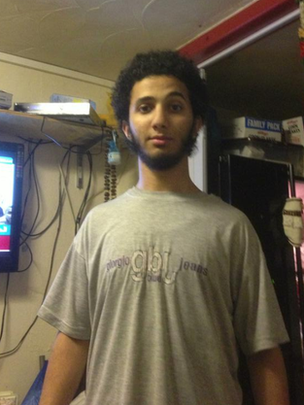
Nasser Muthana's brother Aseel, 17, is also said to have travelled to Syria
The father of aspiring medical student Nasser Muthana, also 20, spoke of his shock at seeing his son in the video.
He added that his younger son, Aseel, 17, had also travelled to Syria in February, several months after Nasser left.
Sheikh Zane Abdo, of the South Wales Islamic Centre in Cardiff and who knew Nasser and Aseel, told the BBC that the brothers had become serious about their faith and had begun expressing political views.
He said that radicalisation over the internet needed to be addressed.
"A platform has been given to this video that really shouldn't have been given," he said.

Islamic State of Iraq and the Levant (Isis)
In 60 seconds: What does Islamic State want?
Isis grew out of an al-Qaeda-linked organisation in Iraq
Estimated 10,000 fighters in Iraq and Syria
Joined in its offensives by other Sunni militant groups, including Saddam-era officers and soldiers, and disaffected Sunni tribal fighters
Exploits standoff between Iraqi government and the minority Sunni Arab community, which complains that Shia Prime Minister Nouri Maliki is monopolising power
Led by Abu Bakr al-Baghdadi, an obscure figure regarded as a battlefield commander and tactician

Last month, a 31-year-old man from Portsmouth became the first person in the UK to be convicted of terrorist offences in connection with the conflict in Syria.
A court heard how father-of-two Mashudur Choudhury travelled to Syria to attend a terrorist training camp. He was convicted of engaging in conduct in preparation of terrorist acts.
Have you been affected by the issues raised in this story? You can send us your experiences by emailing haveyoursay@bbc.co.uk, external using the subject line "Isis".
- Published22 June 2014
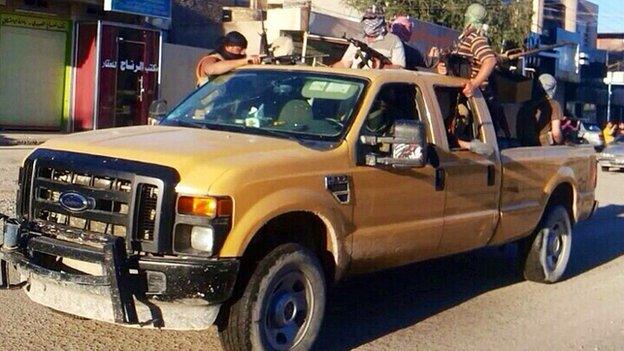
- Published21 June 2014
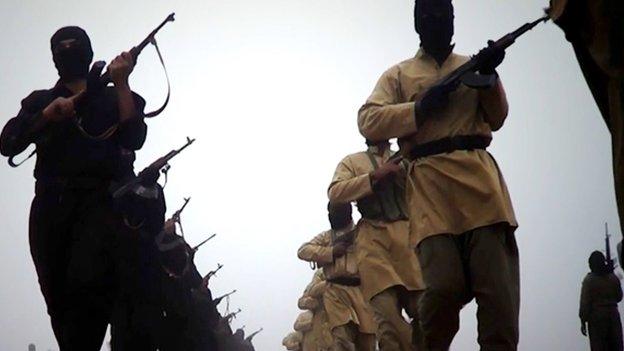
- Published21 June 2014
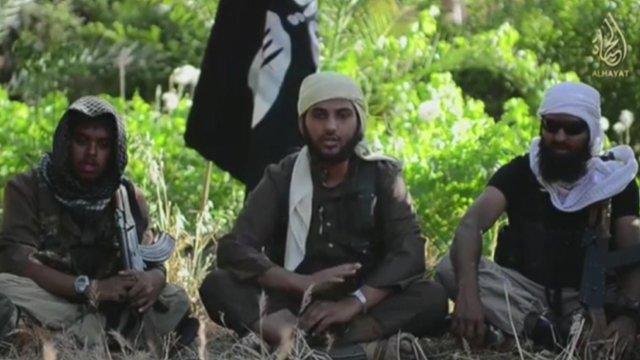
- Published2 August 2014
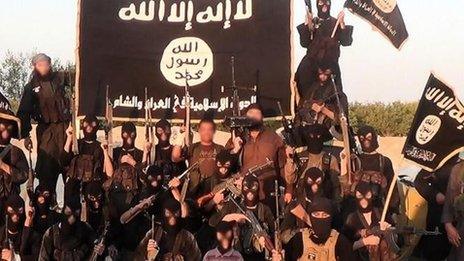
- Published24 April 2014
- Published22 June 2014
